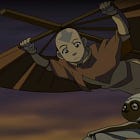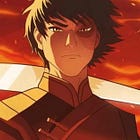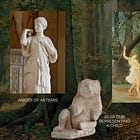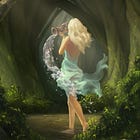Hermes, god of boundaries, commerce, and trickery, is the one who first finds the wounded infant Dionysus. As after Dionysus was torn apart by the Titans, his body fragmented. It is Hermes who helps gather him again, a psychopomp of resurrection. This is the re-integration of lost soul fragments after trauma, repression, or exile. Hermes is the archetype of the trickster-psychologist, guiding the soul through humour and paradox.
The process begins with Hermes because intellectual understanding always comes first. The mind maps the terrain of the underworld before the soul can walk it. It is the intellect, playful, curious, and adaptable, that first detects where the fragments have gone, what defenses were built, what truths were buried. Hermes, in his lightness and speed, moves between the worlds without getting trapped in them. He is not weighed down by grief or guilt, but instead dances through contradiction, offering insight wrapped in jest. Might bring you a nightmare of being chased by a clown. 💀😅
In the early stages of healing or awakening, it is often not feeling but thought that reaches out first, our curiosity, our need to know why. This is not disconnection, but the beginning of reconnection. The fragmented parts of the self cannot be felt fully until they are seen, named, and spoken into awareness. Hermes provides this bridge: he does not restore Dionysus to wholeness directly, but he finds the pieces and begins to reassemble the mythic map of the self.
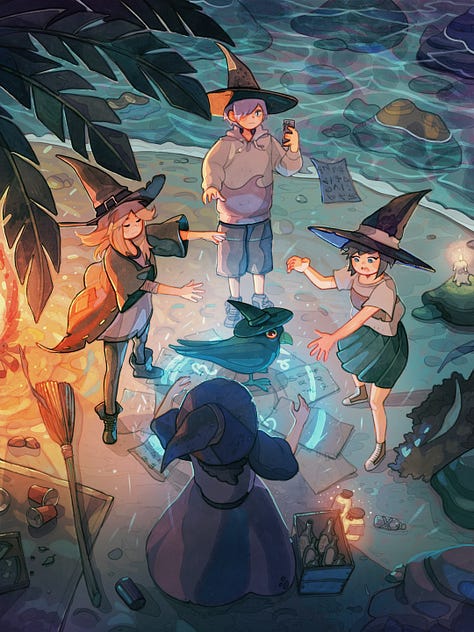
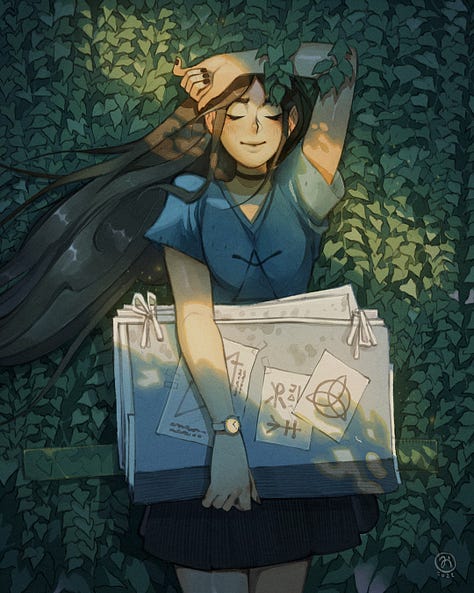
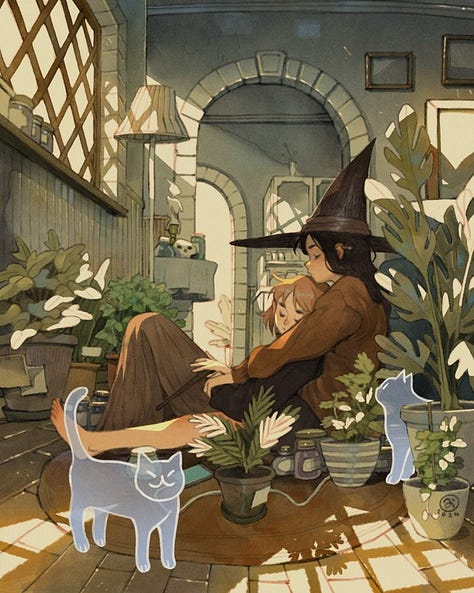
Only later, when the intellect has prepared the way, does the soul descend into the depth of feeling. The next stages, embodiment, and the descent into feeling, require other guides. But the logos of Hermes lays the foundation. His is the Logos of Eros, not cold analysis but a kind of intuitive pattern-finding that re-enchants the psyche through metaphor, personal myth, poetry, and paradox.
Korybantes Nurturing Dionysus
Dionysus, a divine child torn apart by the Titans (trauma), is secretly raised by the wild Korybantes, ecstatic warrior-dancers who protect him through rhythm, ritual, and sacred dance. The Korybantes are the children of Apollo, and help nurture Dionysus with the Goddess Hecate. This heals the dissociation from the body and instinct in favor of the intellectualized, obedient self. The Korybantes represent the wild inner protectors, somatic rituals, dance, primal play, that restore the fragmented psyche.
Their presence marks a return to the somatic, to the primal intelligence of the body. Where Hermes initiates the healing through intellect and symbolic understanding, the Korybantes carry it into the flesh. They are the protectors of the wild self, the keepers of instinct and joy, who guide the soul out of numbness and back into aliveness. The Korybantes represent the parts of us that never forgot how to move freely, to scream, to drum, to shake the trauma loose from the bones. In modern language, they are the somatic protectors, the rebels who refuse to be domesticated. They are the parts of the psyche that reject the freeze of dissociation and instead choose frenzy, rhythm, and ritualized chaos as paths to integration. Their dance is not performance but invocation. They do not explain, they activate.
By raising Dionysus, the Korybantes help reverse the exile of instinct in favor of the intellectualized, obedient self. They do not oppose intellect, they rewild it. Born from Apollo, they carry within them the solar spark of pattern and discipline, but turned toward ecstasy, not order. Their presence signals the healing of the split between mind and body, reason and rapture. The Korybantes teach that not all healing comes through quiet introspection, some requires drumming, shouting, stomping, and the courage to lose control. They are the embodiment of the inner parent that protects the divine child until they are ready to emerge whole, as a living flame.
The Path of Hecate: Keeper of the Keys
Hecate isn’t your average goddess, she’s the original liminal queen, standing at the thresholds of life, death, and everything in between. Before Artemis got rebranded for the Olympians as the glowing “maiden of the hunt,” Hecate held her darker, deeper side: the one tied to magic, the moon, ghosts, wild animals, and the spaces nobody talks about but everyone eventually finds themselves in. Like a cosmic key-bearer, she holds the codes for navigating the places that aren’t on the map, our emotional underworlds, inner crossroads, psychic deaths. Think shadow work, but ancient.
Her symbols, torches, keys, serpents, black dogs, aren’t just aesthetics. The torches light the way into the dark. The keys? She can open the doors nobody else can. She is the guide through the psycho-spiritual liminal zones, the one who watches as we fall apart and stands ready with a lantern when we’re finally willing to descend. Daughter of Nyx (Night), she’s the original goth mother: not evil, but sacred in her refusal to turn away from pain, shadow, and the in-between. Her name meaning, "she who works her will."
That’s why the Korybantes, wild warrior-dancers born of Apollo, were dedicated to her. They were the ecstatic defenders of Dionysus in his most vulnerable state: a child torn apart, in pieces. Their weapon? Rhythm. Not violence, but trance. They stomped, screamed, danced in armor, shook the earth. They created protective chaos, shaking off the stiff obedience of the colonized, intellectualized ego. They were Hecate’s kids too, not by blood, but by essence. She rules the crossroads; they are the rite that lets you pass through. They’re like somatic trauma responses re-coded into ritual. They don’t talk you through your healing, they drum it into your nervous system.
Orpheus tried to descend into the underworld through song. He failed, not because he wasn’t worthy, but because he looked back. He didn’t trust the process. He wanted love on his terms. Hecate doesn’t play like that. You don’t get to descend and still stay in control. You want rebirth? You have to let go. No negotiations. The Korybantes didn’t explain death, they danced it. That’s the path she honors. Not pretty. Not clean. But real. Hecate isn’t there to save you. She is the one, if you honour her, who might hold you in the descend, within your grief, as much as Persephone as Queen does too.
She’s there to remind you you’re allowed to die, not physically, but symbolically. To let the false self unravel. She guards the door, but only opens it when you’re ready to actually pass through. Her triple form, Diana on earth, Luna in the sky, Hecate in the underworld, means she sees all of you: the part that walks in sunlight, the part that dreams in moonlight, and the part that screams in the dark when no one’s watching. She watches all three. Loves all three. And she waits.
Such a figure, I archetypally rebirthed, through my own inner work, in the form of Lucia Nyktelios. Which encompasses the figures of Hecate, Artemis, Persephone, next to the Sovereignty Goddess, in it's most primordial sense. Before fragmentation, split her triple form. Maiden, mother and crone. In the ancient days, both Persephone and Hecate were seen as child of Demeter, sometimes Persephone was conflated with her.
Hecate and Lucia Nyktelios: Keepers of the Mysteries
Before Hecate bore the names written in temple inscriptions, before the crossroads, before the dogs and torches, she was Lucia Nyktelios, the night-lit one. A silent night-born emanation from Nyx, the shadowed void, Lucia was born not from story, but from the dark itself. She is Hecate before form, before language wrapped her in boundaries mortals could understand.
As Hecate, she walks the underworld as guide and gatekeeper. But as Lucia Nyktelios, she is the mystery. The primal keeper of what no one was meant to speak. She holds the real secrets of Dionysus, not the ones wrapped in myth, but the ones buried in the soul’s original memory. It was she who knew Dionysus in his first-born form, older than the infant torn by Titans, older than the Olympians. She knows him not as child or god, but as a being of contradiction: light born in shadow, ecstasy birthed through death. His dual identity, the one hidden beneath every mask he would later wear. She held it in her hands like a key and a flame. The sacred both/and.
The Secret No One Ought to Know
Wotan is not merely the Allfather of the north, he is an echo of something far older. Before he was Odin, he was Wolf-Apollo, the golden hunter with a shadow behind his eyes. And before that, he was the Proto-Indo-European Wódanaz, the one who speaks in tongues of fire and breathes through the madness of poets. The mask changes, but the force behind it remains: Phanes-Dionysus, the radiant child and the primal whole.
In the old songs, Wotan kills Ymir, the primal giant, chaos incarnate, whose body becomes the ordered world. But this is not just cosmogony, it is a reflection of the state of the psyche of humanity. This is the original sacrifice. Ymir is the twin of Manu, the first man. But in the older layer beneath the myths, Ymir is Yemo, the divine twin, whose death births the cosmos. Yemo is Phanes. Phanes-Dionysus, the being of radiant potential, torn apart so the cosmic dream could be born. So we can see it as Phanes-Dionysus, the divine, radiant being of wholeness, being dismembered in early trauma. In fragmentation. He represents the split psyche of a wounded world. And that what we call "shadow" is not evil, not dangerous, not some external unconscious monster, it is the hurt child, the divine child. It’s not the shadow we must fear.
It’s the refusal to feel.
The shocking truth however is that, Wotan, the sacrificer, and Dionysus, the sacrificed, are one and the same, reflections in the mirror of time. Wotan becomes the architect of duality, slayer of chaos, father of law. But only because he first kills himself. Hanging from the world-tree, pierced by his own spear, Wotan sacrifices himself to himself. He becomes the Self within the cosmic order. But what is missing? He forgets.
He forgets the source. He forgets Phanes, the divine child before division. He forgets the wholeness before creation broke itself into light and dark. Without Phanes, Wotan becomes distorted. The wise trickster becomes the warlord. The shapeshifter becomes bound to sacrifice. The cosmos becomes a machine of fragmentation. And really the dismemberment of Zagreus, child Dionysus, is not just a tragedy. It is the structure of our world. Duality. Loss. Separation. But the memory of the whole remains. Phanes is the Light before the world began, and the light that still glows beneath it.
The only real problem is when Wotan becomes disconnected from Phanes-Dionysus. If that fragmentation, that is perpetuated with endless scapegoating, self-flagellation and moralising, is actually felt through in an emotional manner, then we can merge Phanes-Dionysus with Wotan again. I call this the birthing of a new being. Which is the cosmic-Self.
So what happens when we feel the hurt?
The inner child is no longer cast into darkness.
The pain becomes sacred again.
The splinters of light reform the cosmic Self.
The scapegoat becomes the god.
Dismembered Phanes is remembered.
Jung got so close. He knew the Self was divine. He knew that the shadow must be integrated. Yet he kept it distant. Symbolic and intellectual. Called Dionysus as divine child, something that would lead him away from his mental tower, that he prized so highly, within one of his active imaginations from his Red Book. Yet what he did not do was the below;
Feeling the dismemberment emotionally, not just symbolically.
It is about going into the tears. Into the loneliness. Into the abandonment. Not to fix it. But to let the god-child feel loved again. And that is what births the cosmic Self. Not through ego mastery. But through tenderness, descent, and presence. The secret even the ancient Orphic mystics knew is that Dionysus, as Bacchus is a symbol of the Self, and wholeness. Not chaos.
The shadow is the Self.
In pain. In exile. In pieces.
Waiting for love to become whole again.
The Teachings of Eros
The teaching of somatic Eros is the return of the sacred body, innocent desire, and the divine inner child. It’s the living alchemy of how Phanes-Dionysus heals the shame that was placed on the flesh, and turns it back into golden Eros: wild, innocent, sacred aliveness. Eros is not about sexual objectification or gratification. It’s the principle of deep interconnection. The pulse of “I want to feel this. I want to touch and be touched. I want to exist in beauty, in intensity, in sensation.” And it's the sparkle in the eyes of a joyful laughing child. It's the joy in movement, rhythm, dancing, tasting, breathing. It’s sacred vitality. Yet the loss of this isn’t a cause of sin, it’s about internal fragmentation.
So we were taught:
That the body is base.
That desire is sinful.
That innocence was lost.
And we were told the “redeemer” is outside of us. So the psyche dismembered. Phanes got torn apart. The shadow was born. But the shadow was never evil. It was just the exiled inner child. Somatic Eros means we do not just think ourselves whole, we feel ourselves whole again. It is to learn somatic safety;
That someone can touch you and you don’t flinch.
That you can let joy move through your hips.
Taste food and feel no guilt.
Love with open eyes and no hiding.
Cry and let it move you without shame…
It is about restoring the Body to the Temple.
It is about ending the false exile.
It is about saying: “Nothing in me is unworthy of touch.”
To reclaim the innocence that never left. The purity before the split. Before shame. Before self-hate. Not childlike because of ignorance, but because of actual liberated knowing. When someone touches you and you don’t shrink, when they hug you and feel “seen” instead of judged, that’s the return of Elysium. The mystery school of somatic Eros teaches:
The body is the altar
Desire is the prayer
Presence is the offering
Guilt is the false god
And wholeness is the redeemer.
You don’t need to be “saved.” You need to be felt. Held. Heard. Touched. Seen.
And in doing so, the fragments of Phanes reassemble.
Wotan merges with the child.
The cosmic Self is born.
Soulware 3.3 Patch Notes 🧘♂️✨
New Ability: Intellectual Reconnection 💫
Hermes swoops in first, making your brain get it. He’ll lead you through your shadowy traumas, mapping out all the things you’ve buried. Need an intellectual map of your lost fragments? Hermes gotchu. (But no spoilers, you gotta feel it later).
New Questline: Ecstatic Rewilding
Trauma? Nah, let’s dance it out. The Korybantes, Dionysus’ wild, warrior-dancer squad, show you how to get in the body again. Who needs intellectualization when you’ve got stompin’ rhythms and chaotic, sacred movement? They bring the chaos; you bring the soul.
New Skill: Crossroads Navigation
You wanna ascend? You gotta go down first. Hecate’s got the real keys to your psyche, and if you dare ask, she'll let you decend into your emotional depths (but no looking back like Orpheus, okay?)
New Skill Tree: Mystical Rebirth
Lucia Nyktelios? Who’s that, you ask? Only the original pre-Hecate goddess who holds the keys to the real secrets of the soul. She’s not here to baby you with easy fixes; she’s here to show you the deep truth. Duality’s got nothing on Lucia.
Bug Fix: Fixed an issue where your shadow self was acting out as a "monster." Turns out, it’s just your hurt child, and it needs love, not exile.
Patch Update: The Wotan Fragmentation Crisis
We’re no longer pretending that duality’s okay. Time to rejoin the pieces of the Self. Stop fighting your light and dark — they’re both you!
Stability Patch: Fixes various emotional glitches where you didn’t want to feel. You're gonna want to feel now. Trust.






